Mary Hickey isn’t going to let something like a broken shoulder stop her from running the Dublin Marathon.
This truly remarkable woman has completed each of the 38 editions of the 26-and-a-bit-mile jaunt around the capital since it was first run in 1980.
Back then she was just one of 70 women in the 2,000 strong field – quite the contrast to the 7,000 women who will line up amongst 20,000 entrants at the start on Fitzwilliam Square on Sunday morning.
I ran 1,509 miles and raised €73,000 for the RNLI. It was well worth it because I met the most fantastic people
Hickey has run marathons through pregnancy, indescribable grief, illness and all sorts of weather – including the so-called Toughest Footrace on Earth, the six-day 250km Marathon des Sables through the scorching Sahara Desert.
Nope, a shoulder broken in three places won’t stop Mary Hickey, who will be joining 40 friends to raise funds for Wicklow Hospice Foundation.
"I’m always competitive, but I’m injured and I expect it to be a day of survival," said the 66-year-old from Arklow.
"I want to get around and the aim is to run well next year. I might have to walk a fair bit of it, or even it all, which I’ve never done before."
It’ll probably take her more than six hours – that’ll be her second slowest Dublin Marathon. She had a good excuse back in 1989 for taking so long too.
Mary raised..... wait for it...
— Mary Hickey (@RNLILapoftheMap) June 23, 2018
€71,950.35 for the @RNLI!
Thank you so, so much to everyone who helped, in any way!
Most of all thanks to everyone who donated! Your contribution will help to save lives at sea. pic.twitter.com/IVwgQHl9uV
"My youngest son Calvin is 29 and 29 years ago I ran it when I was six and-a-half months pregnant," she recalled with her typical good humour.
"I took my time, I was fit and I was healthy and I wouldn’t recommend anyone to do anything like that if they weren’t experienced and didn’t know their own body well.
"I knocked on a few doors along the way to use their toilets and I got around in good form. I think it took me about six hours. He was a 10lb baby so there was nothing wrong there!"
Mary has two surviving children, Calvin and Tony. Her eldest Stewart died when he was only 20. He got caught up in drugs young – she lovingly describes him as a ‘little divil’ – but he’d started to turn his life around.
"He was in recovery and recovering well. One night he had a few cans of beer, went to bed, got sick and choked. It was a horrible way to die and that he was on the mend makes it more tragic to me," she said.
"You’d often wonder how you’d cope when things like that happen, but then they happen and you just cope. When Stewart died I felt like I’d never do anything again... You go down or you go up and I always try to go up."
Hickey made the start – and the finish – that year too.
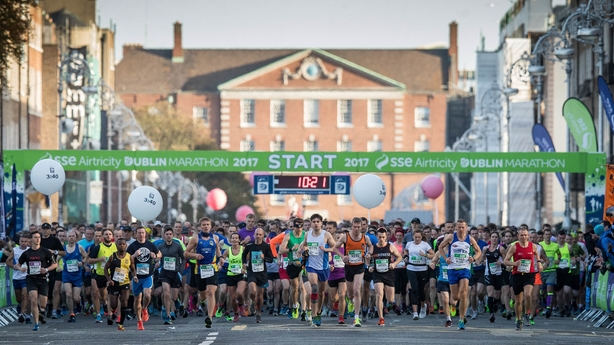
Last year her ex-husband Tony Hickey, who she remained close to, was suffering with cancer but he didn’t want to lose his own Dublin Marathon streak either because like Mary he was one of the 1980 originals that had run every one.
She and their friends didn’t let him down and they pushed him around in a wheelchair. Tony died this year – another blow that Mary won’t let get her down.
"I never ran as therapy," explained Hickey. "I started running in ’68 and little did I know how helpful it was going to be for me in my life. I remember talking to a psychologist once and he asked did I take any medication and I said that I run and his answer was that it was better than any drugs. It’s great for mental health.
"When you’re out running with a group you get chatting and it’s a great stress-reliever. It should be prescribed.
"I don’t think everyone should be running marathons, but people should be out in the open air and jogging 5km or 10km. People should be doing it unless they have a good medical reason for not doing it."
Hickey set up The Lake coffee shop in Arklow’s Coral Leisure Centre in the teeth of the recession back in 2011 and after some tough years business is going well.
As well as a bit of coastal rowing, she runs a local running group, Coral Runners, which spawned the creation of an athletics club – Inbhear Mór AC – for more competitive people, though she likes to keep the group for recreational and social runners.
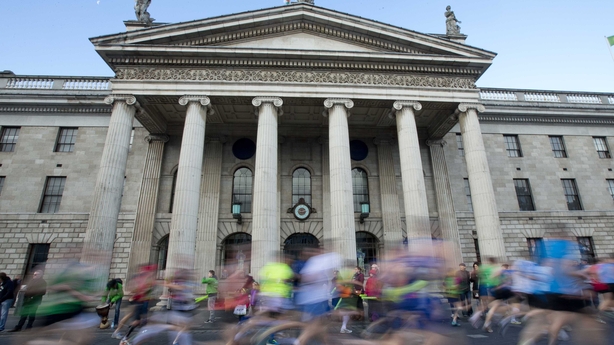
It was on one of these club runs around the nearby lake that she stumbled and cracked her shoulder back in May and she’s still rehabbing the injury.
As with everything in this life, it’s something that Hickey dealt with. The only thing that annoyed her was the fact that it happened a month after she ran 1,509 miles around Ireland – yes, you read that right – to raise money for the RNLI, which she cruised around without picking up any serious injuries.
After years dedicating herself to work, she decided that she wanted to take a little time off and do something different, so, as you do, she said she’d run the entire coast of the island. To make it more worthwhile, she raised money - €72,000 – for the lifeboats, a cause close to her heart as someone who lives by the coast and rows on the sea.
She set out on her own with no following support crew – she had a small team back in Arklow which grew as her journey went on – and she was prepared to run the whole thing alone, though most days she was joined by at least a handful of people keen to keep her company.
She started on New Year’s Day and finished up slightly earlier than planned on 14 April, only taking the occasional day off along the way, running anywhere between 40km and 50km a day. The biggest obstacle she encountered was the big snow in February, which cost her three days in lockdown in Listowel, County Kerry.
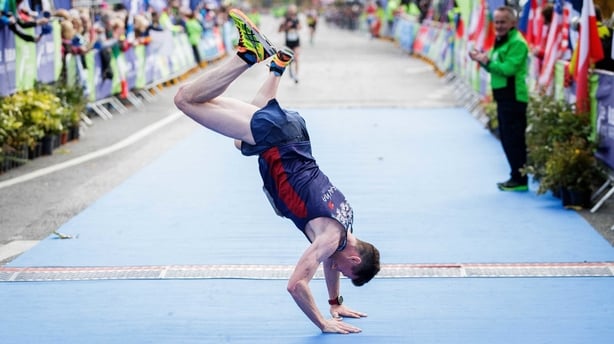
"I had it planned, but not meticulously. I got out a map and a biro and I started putting circles around towns on the coast," she said. "My first stop was Greystones, then Howth and on up the coast. I was just looking at the map and I had people asking me ‘do you know how far it is between those towns?’.
"I started in January, headed north and kept the sea on my right the whole time because I’d get lost in the supermarket! The support I got was amazing, just fantastic.
"I ran 1,509 miles and raised €72,000 for the RNLI. It was well worth it because I met the most fantastic people.
"My team were great – they’d work out who would take my big bag from one stop to the next, where I’d be staying. There was a lot of support and people running with me, but there were days when I was on my own and I felt those were days I needed to be on my own."
She’s the only woman, there are less than a dozen men, who have run every Dublin Marathon to date.
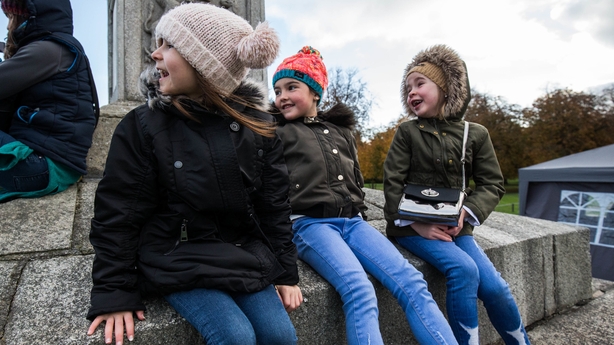
Hickey lists the year she was pregnant with Calvin and 1982 when she ran her 2.57 personal best as her stand-out memories from the event.
She says she has a ‘good few’ left in her yet and in her near four decades running the race the huge boost in the number of female entrants has thrilled her the most.
Recalling her first, she says: "I saw an advertisement in the RTÉ Guide and I’d seen something about marathon running in an American magazine and I wondered to myself could I run a marathon.
"There were no training plans or schedules to follow back then – I got hold of a book about running marathons and adapted it to suit me.
"I had only done one 18-mile run before so coming up to mile 18 on the day I was just going into this big black hole and I didn’t know what was on the other side. There were people dropping out all around me, it was a war-zone, but I kept going.
"I couldn’t walk for about a week afterwards! I’m so glad that people have advice and training plans and good shoes now.
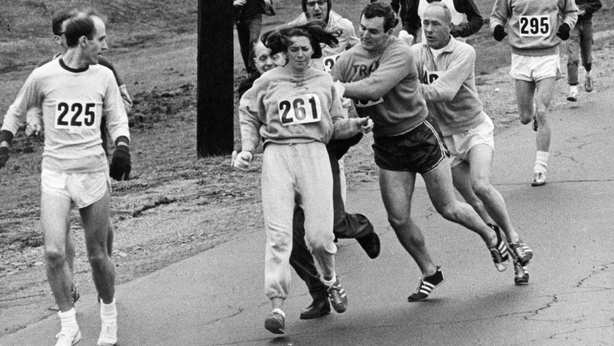
"I remember being at the start and us sporty women, the men were all looking at us like we were aliens – ‘what are you doing here?’.
"The women are unreal – they have stamina and resilience and they’re great at holding a pace. Running a marathon is all about pacing.
"I see the girls and they just truck on; with the chaps, and I’m not being sexist, I see them throwing in the towel because they’re not able to keep at a strong pace. (Note - This is supported by scientific research).
"In races when I started I’d be running along and I’d be trying to keep pace with or catch the woman in front of me.
"I’d pass the guys and all of a sudden they’d blast past me. I might pass them again a bit up the road and they’d up their pace again to catch me. I’d be thinking to myself ‘I’m not racing against you!’ They didn’t want to be beaten be a woman, but that’s changed now – there’s respect."


